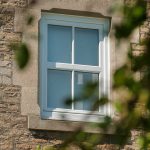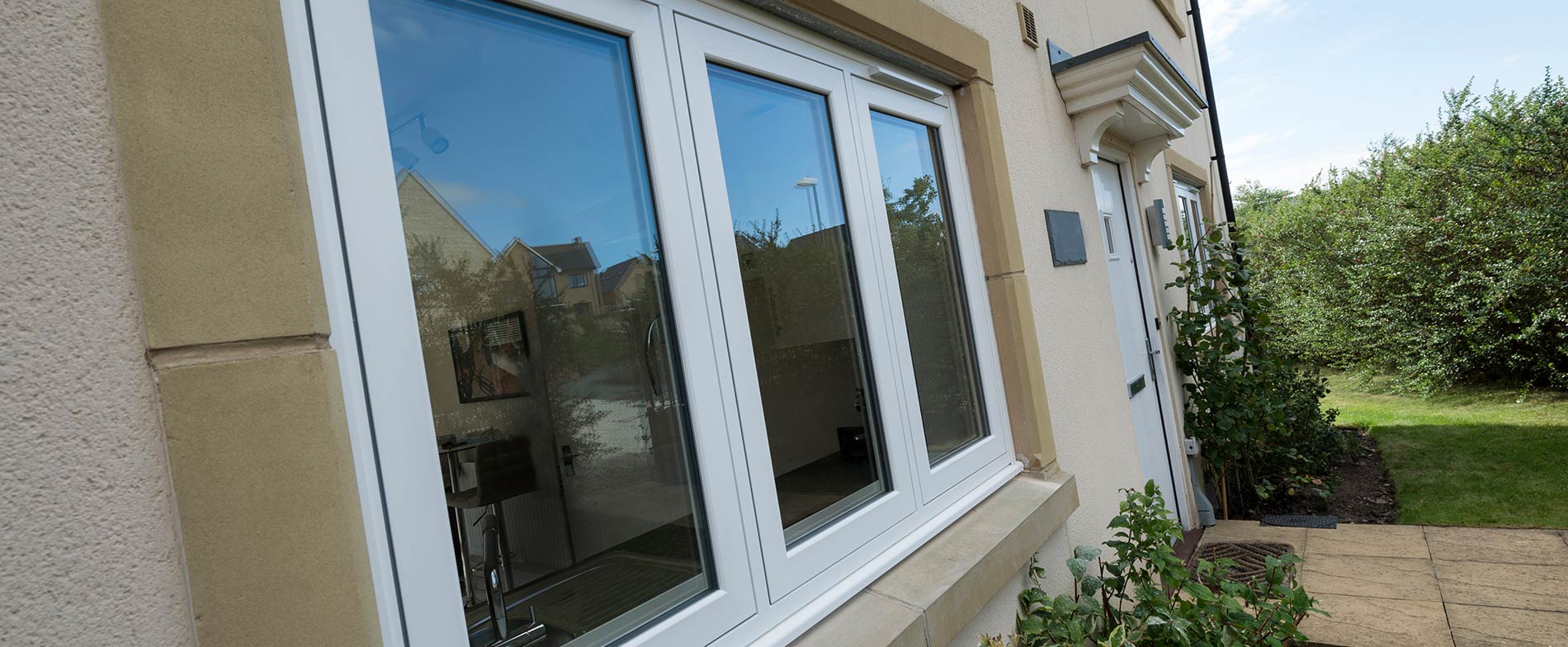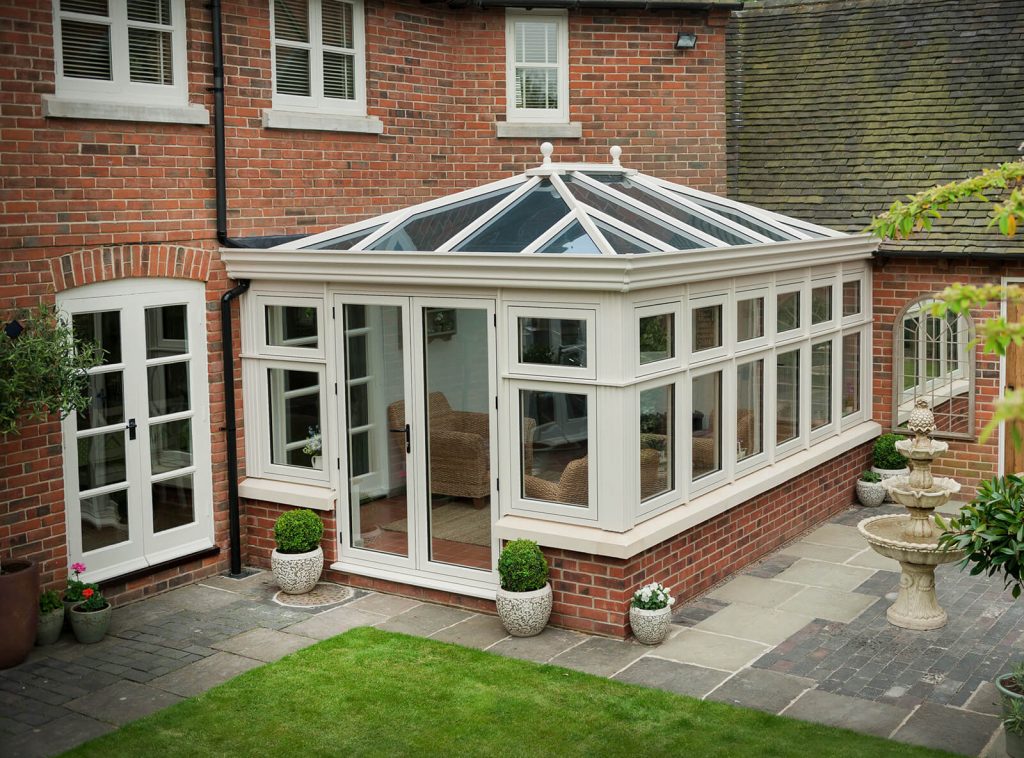Windows in Greater Manchester, Cheshire & beyond
Stylish and practical with options suitable to any type of property.
View product Key Highlights
Key HighlightsChoosing new windows for your home is an important decision. You need to think about how they look, how well they work, and how much they cost. Among the many choices, uPVC windows and aluminium windows are very popular. This guide will help you understand each type. This way, you can feel sure when you pick new windows for your home.
When it comes to choosing between aluminium and uPVC windows, there are several factors to consider. Both materials have their own set of pros and cons, ranging from durability and aesthetics to energy efficiency and cost. In the UK climate, each type performs differently in terms of security and noise reduction. Furthermore, the window choice you make can impact your home’s value and sustainability in the long run. By understanding these key points, you’ll be better equipped to make an informed decision that aligns with your needs and preferences.
In the world of window types, uPVC and aluminium are the top choices. uPVC stands for unplasticised polyvinyl chloride. It is a light and strong material. People like it because it is low maintenance and provides great insulation. uPVC window frames have several chambers that hold heat, making them energy efficient.
Aluminium frames, on the other hand, are known for their strength and lasting quality. They also have a stylish, modern look. In the past, they were seen as less energy efficient. However, new technology called thermal break has made aluminium windows much better at keeping in heat.

One key benefit of uPVC windows is that they need very little maintenance. uPVC frames resist rot, rust, and fading. You only need to clean them occasionally with soap and water to keep them looking good.
uPVC windows come in a wide range of colours and finishes. This gives homeowners the chance to create the look they want. You can choose from classic white to woodgrain effects that look like traditional timber windows. uPVC frames can match any architectural style.
Also, uPVC windows are more affordable than aluminium options. This makes them a smart choice for homeowners who want quality and style without spending too much.

Aluminium is a strong material that can handle different weather conditions. It does not warp, rust, or fade. Aluminium windows last a long time and keep their shape and look for many years.
You can choose from a wide range of colours and finishes for aluminium windows and doors. If you want a modern look with a shiny finish or a bright color for a bold touch, aluminium helps you customise your choice.
This flexibility is also seen in many styles, such as sleek, simple frames or classic designs. Aluminium is very strong, which means it can have thinner frames. This lets in more natural light, making your home brighter and more inviting.
Both uPVC and aluminum windows have their own benefits. Comparing how they perform and last can help you find the right choice for your home. Both types are great at standing up to weather. This means they will last a long time with little care needed.
If you want a window that will last the longest, aluminum is usually a better option. But new developments in uPVC technology are closing the gap. Now, both materials are solid choices for long-term investment.
|
Window Type |
Pros |
Cons |
|
Aluminium |
• Highly durable (40+ year lifespan) • Slim frames, larger glass areas • Modern, sleek appearance • 100% recyclable • Resistant to warping and corrosion • Wide range of colour options |
• Higher initial cost • Less energy efficient (unless thermally broken) • Can conduct heat/cold • May require occasional lubrication |
|
uPVC |
• Excellent energy efficiency • More affordable • Low maintenance • Good noise insulation • Resistant to rot and rust • Various colour and wood-grain options |
• Shorter lifespan (20-30 years) • Thicker frames, less glass area • Can discolour over time • Less environmentally friendly • May not suit all architectural styles |
The UK’s weather can change often, so window frames need to handle rain, wind, and changes in temperature. Both uPVC and aluminium do a great job of resisting tough weather.
The debate about uPVC vs aluminium is common. uPVC is naturally water-resistant, so it stops rot and bending. On the other hand, aluminium has a protective layer that makes it really good at resisting rust.
Using double glazing helps even more. It creates a barrier that keeps homes warm and dry. No matter which material you pick, double glazing is important for staying comfy and saving energy in the UK.
uPVC windows are known for lasting a long time and needing very little upkeep. They do not rot, warp, or get damaged by insects like wooden frames do. To keep them looking clean, you just need to wipe them with a damp cloth.
Aluminium windows are also very durable and can last a long time. They resist corrosion and weathering, so they perform well for many years with little maintenance.
Both windows are long-lasting, but generally, aluminium lasts longer than uPVC. This makes aluminium a good choice for a long-term investment.
In the past, uPVC windows offered only a few designs. Now, they have changed a lot. They come in many colours and finishes, including designs that look like real wood. This makes them fit well in both modern and traditional homes.
Aluminium is popular for its modern look. It gives more design options. You can have thinner frames with small sightlines, which lets in more natural light. This creates a clean look that many people love in modern buildings and home offices.
uPVC windows have proven that they can be stylish. Today, UPVC frames come in many colours to suit different tastes and building styles. You can choose from classic white to vibrant shades that stand out. It’s easy to find the right colour for your home.
uPVC frames also fit different window styles. Whether you want a traditional casement window, a flexible tilt and turn window, or a charming sliding sash window, UPVC frames can meet your needs for both function and style.
Additionally, modern production methods allow various finishes on uPVC frames. You can have a sleek, modern look or a textured finish that resembles wood. uPVC gives you the chance to match any design you like.
Aluminium windows are popular because they look modern and fit well in today’s homes. They can have thin frames, which helps bring in more natural light and makes the space feel open.
But aluminium frames aren’t just for simple styles. You can choose from a variety of styles, like:
With their strong and light design, aluminium frames work well for large windows and different shapes. This gives homeowners many options to create unique looks.
Energy efficiency is very important when picking windows. It affects how comfortable you feel and how much you pay in energy bills. uPVC windows are great because they insulate well. They help keep heat in and lessen your need for heating systems.
Aluminium windows used to be seen as not as energy-efficient. However, they have improved a lot recently. New technology called thermal break helps them insulate better. Now, they are a good choice, similar to uPVC windows.
The uPVC window frames have a special design with multiple chambers. This design creates a barrier that traps heat inside. It reduces heat loss and helps your home be more energy efficient. As a result, you need less energy to keep your indoor space comfortable. This can lead to big savings on your energy bills.
Also, uPVC has built-in insulating qualities. This means it stops cold air from coming into your home during the colder months. It helps to reduce drafts and cold spots. By keeping a stable indoor temperature, uPVC windows make your living space comfy all year long.
Choosing energy-efficient uPVC windows is a wise choice. It not only helps the environment but also saves you money in the long run because you will use less energy.
Aluminium windows have undergone significant innovation in recent years, notably with the introduction of thermal breaks. A thermal break is a material with low thermal conductivity, such as polyamide, that is inserted between the inner and outer aluminium profiles of the frame. This effectively reduces the transfer of heat through the metal, significantly improving the window’s energy efficiency.
The following table illustrates the impact of thermal breaks on aluminium windows:
|
Feature |
Traditional Aluminium Window |
Aluminium Window with Thermal Break |
|
Thermal Conductivity |
High |
Low |
|
Energy Efficiency |
Low |
High |
|
Condensation Risk |
Higher |
Lower |
|
Comfort |
Lower |
Higher |
By minimising heat transfer, thermal breaks help maintain a comfortable indoor temperature, reducing the need for excessive heating or cooling and contributing to lower energy bills. Combining aluminium frames with energy-efficient glazing options such as double or triple glazing further enhances their thermal performance, making them a compelling choice for energy-conscious homeowners.
Choosing between uPVC and aluminium windows depends on what you need and like. uPVC windows are great for energy efficiency and are low maintenance. On the other hand, aluminium windows provide stylish designs and better durability. Think about things like how well they handle the weather, how they look, and how well they keep heat in. This will help you make a smart choice. If you care more about saving energy or want designs you can customise, both types of windows have benefits. Take time to evaluate what you need to pick the best fit for your home. If you feel unsure, ask experts for advice that’s tailored to you. Your windows are important for how your home works and looks, so choose what suits your long term plans.
Aluminium windows are generally more durable, longer-lasting (40+ years), slimmer (allowing for larger glass areas), better suited for modern designs, and 100% recyclable, but they come with a higher initial cost. On the other hand, uPVC windows typically offer better energy efficiency and insulation, lower initial costs, easier maintenance, and good performance in various weather conditions.
Both uPVC and aluminium windows can provide good security levels. This will depend on the locking systems and glass used. However, aluminium is strong and has sturdy window frames. This makes it a popular choice for homeowners who want better security.
Both uPVC and aluminum windows can really help reduce noise, especially when they have double glazing. The way these materials work together, along with the insulation from the glazing, makes it harder for sound to come in. This helps to make the inside of your home much quieter and more peaceful.
There is a clear price difference between uPVC windows and aluminium windows. uPVC windows usually cost less at the start. But, the cost of aluminium windows makes sense over time. They last longer and are very durable.
Both uPVC and aluminium windows can increase the value of your home. They improve energy efficiency and look good. But how much they help your home’s value can depend on the type of building and local market trends. The special features of the windows you choose matter too.
Both options help make a home more sustainable by being energy efficient. Aluminium stands out as a highly durable material. It lasts much longer than many other options, which makes it better for sustainability. If you choose aluminium that is sourced sustainably, it becomes even more eco-friendly.
 Droylsden Glass boasts over 40 years’ experience in the installation of thermally efficient and highly secure windows, doors and conservatories for homeowners throughout Manchester and Cheshire.
Droylsden Glass boasts over 40 years’ experience in the installation of thermally efficient and highly secure windows, doors and conservatories for homeowners throughout Manchester and Cheshire.
Do you have a general query about one of our products or would you like to know about available options and styles? Get in touch with the team at Droylsden Glass today.
Contact usStylish and practical with options suitable to any type of property.
View productEnhance your home’s entranceways in a variety of different ways.
View productIncrease the living space in your home with our assortment of glazed extensions.
View productKeep your roofline performing as it should with our selection of roofline products.
View productTransition from the outside to the inside of your home in total style.
View productGarden canopy options to suit all Greater Manchester, Cheshire, and Northwest homes.
View productWe are accredited by a variety of highly reputed regulating bodies that cover the construction industry.
We have been carrying out quality installations in Chester, Warrington, Wirral, Trafford, Bolton, Oldham, Manchester, Cheshire, Tameside & Stockport for over four decades. View our products by visiting our showroom today.
42-56 Audenshaw Road
Audenshaw
Manchester, M34 5HJ
For sat navs use the address below
York Street, Audenshaw, Manchester, M34 5HJ











